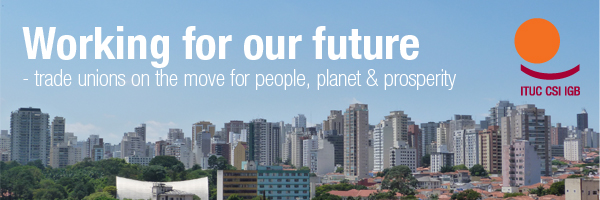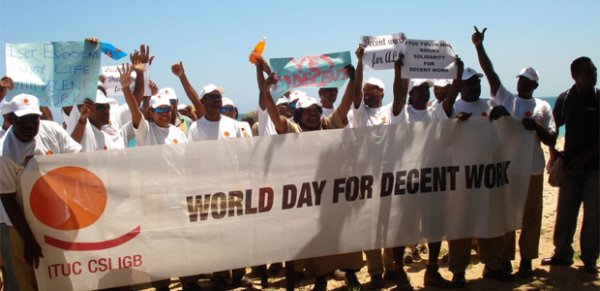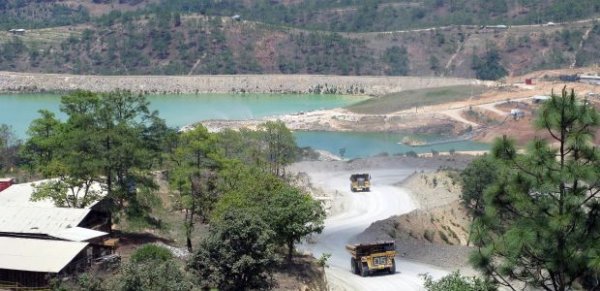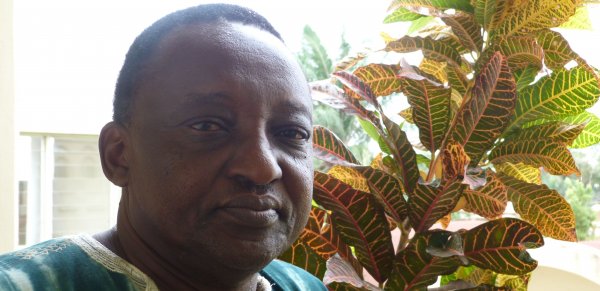| ITUC Newsletter is produced by the International Trade Union Confederation |
 |
|
Post 2015 Made Simple: What |
What is Post 2015 now again…? |
 |
May 31, 2013: The ITUC is urging the United Nations to lift its poverty benchmark from $1.25 per day following the release of the report of its High-Level Panel on the post-2015 development agenda, to help realise the ambition of ending extreme poverty through sustainable development. Though the report offers a solid starting point, UN Member States will need to go much further in their commitments if the Post 2015 Agenda is to be truly transformative.
“There is much which is good in this report, and we now need to see much stronger focus on providing decent work, universal social protection and meeting the massive challenge of tackling inequality,” said ITUC General Secretary Sharan Burrow. “We need the UN to throw its full weight behind efforts to realise fundamental rights, to ensure working people can lift themselves out of poverty and provide for their families. These ambitions cannot be achieved if the global community carries on with business as usual.”
The Panel’s emphasis on human rights and the accountability of governments, public institutions and the private sector to people is notable, as is the acknowledgement of the interconnectedness of economic and social development with environmental sustainability and climate change.
While unions welcome the emphasis on inclusive growth, financial stability and long-term investment, the absence of an absolute commitment to achieve decent work for all is a serious omission.
Job creation, worker’s rights, social protection and social dialogue cannot be seen as too lofty an ambition for developing countries. This is discriminatory and an acceptance of exploitation.
The reports emphasis on the role of business in development is understandable, but should be complemented by the equally important role of workers. So it is regrettable again that Panel fails to recognize the importance of the Social Dialogue for increasing productivity, creating better working conditions and building stronger and more cohesive societies.
“Instead the report sets a goal to bring the number of people living on less than $1.25 per day to zero. This is what Bangladeshi workers producing garments for global markets are paid today, as are construction workers building skyscrapers and football stadiums in Gulf countries and agricultural workers producing for global food corporations. Corporate accountability cannot be left out of the equation if we are to truly tackle the roots of extreme poverty, and multinationals should reform their own operations and supply chain responsibilities to ensure environmental sustainability, decent work and a proper living wage” said Burrow.
Finally, the international trade union movement stresses that the path forward for UN Member States to agree Post 2015 commitments must be democratic and inclusive. It remains committed to achieving an outcome that responds to the demands of workers and communities around the world.
_________________________________________
 |
June 3, 2013: Do we have to choose between jobs and environment? Can workers benefit from a more sustainable economic model? What should we do to ensure that the protection of nature comes with more prosperity and rights for working people?
These are just a few of the questions unions will be discussing in the upcoming International Labour Conference, which for the first time will put the issue of sustainability and green jobs as a key topic for discussion for ILO constituents: workers, employers and governments.
In this debate, unions will be showing that the world of work is at the forefront of the challenges arising from environmental degradation and as such, it must develop a strategy to shift from this unsustainable model of production to a sustainable one. More information on the discussion can be found here.
_________________________________________
 |
June 5, 2013: ILO + Sustainability = True: Guy Ryder, Director-General at the ILO explains it all to us.
1. How does the ILO work with sustainability?
The ILO has been actively engaged in sustainable development for a long time. Initially, it focussed on the close relationship between the working environment, in particular safety and health at work, and the general environment. This remains a very relevant line of work as we can see from the disastrous effects of major industrial accidents or the risks from hazardous chemicals.
In recent years, it has been more and more recognized that the world of work and sustainable development are linked very closely also in terms of employment, incomes and social inclusion. In the outcome of the UN Conference on Sustainable Development in Rio de Janeiro in June 2012, world leaders and the international community recognize that decent work must be a central goal and driver for sustainable development.
Without environmental sustainability, we cannot achieve sustainable enterprises with stable and decent jobs. Greening enterprises and indeed entire economies is not an option from a labour market perspective, it is a necessity. But it is also true that greener, environmentally sustainable economies will remain an elusive goal without the support of the world of work, without the daily active engagement of millions of employers and managers and hundreds of millions of workers. Our Green Jobs Programme and the ILO’s International Training Centre in Turin have been building the capacity of ILO constituents to analyse and act on these links. We have already assisted over 25 countries to formulate policies and practical programmes tailored for their national circumstances and the ILO stands ready to provide further assistance whenever governments or the social partners request.
2. Is it possible to combine decent work with job creation in a greener economy?
Over the last few years, we have very actively studied this question and also looked at the experience in countries with shifting to a greener economy. The evidence produced by ILO and many others shows that we do not have to choose between jobs and protecting the environment for current and future generations. A greener economy can lead to net gains of 15-60 million additional jobs, perhaps even more. This is significant, even if we recognize that some jobs may be lost and the workers employed elsewhere. Particularly in the current economic crisis and in the face of high general unemployment in many countries, a strong push for investment – public, but even more so private – into a greener economy can be an effective short-term measure and one which does not increase the mortgage we have already taken out on the future, but invest in the chances of youth and future generations. This is an important element of the ILO Global Jobs Pact adopted in 2009. In the early crisis response many governments headed this advice and to good effect. Unfortunately, it has been abandoned prematurely.
Whether we will see a net gain in employment and what the quality of these jobs will be is not a given. It will depend on the policies which are used to drive the transformation. In fact, the opportunities to improve the quality of existing jobs in the shift to a greener economy are much larger than those of creating additional jobs. Well over a billion workers could benefit in agriculture, in construction and in waste management for example. To get these positive outcomes, but also to master the challenges of restructuring and of job and income losses due to climate change, we need coherent policies, which align economic, social and environmental goals. The report launched by the Green Jobs Initiative of UNEP (The United Nations Environment Programme coordinates United Nations environmental activities, assisting developing countries in implementing policies and practices. UNEP has played a significant role in developing environmental conventions and has also been active in funding and implementing environment related development projects.), ILO, IOE and ITUC in June 2012 summarizes the policy lessons and contains many examples of what can be achieved and how.
3. What makes a job sustainable?
Like enterprises, jobs will ultimately only be sustainable if they align the three dimensions of sustainable development. They have to be productive and economically viable and there has to be sufficient demand for the goods and services they produce. They also have to be decent work, because only then do they enable the workers concerned to benefit fairly from their work and so contribute to social cohesion, to inclusion and to poverty reduction. The ILO has always been clear on that. The Rio Conference has given the strongest endorsement yet.
And we need environmental sustainability across enterprises, national economies and globally. At the moment, production and consumption patterns are clearly not sustainable and we need to change that urgently and quickly. We already have seen the losses of hundreds of thousands, even millions of jobs and livelihoods because natural resources have been overused or the impact of climate change has disrupted and undermined enterprises.
4. For you personally, what area of sustainability does your heart beat extra for?
The realities of climate change which affect us all and which bring home the urgency of moving on it before it’s too late. I say this not just in my professional capacity but as an ordinary citizen. It makes your heart beat faster though not in a positive way, it makes you sweat a bit.
5. Is the future of workers green?
In a sense, hopefully, yes. If we do not move towards a greener economy decisively and soon, the consequences for jobs, incomes and poverty reduction will be disastrous. The International Labour Conference this year will discuss the link between sustainable development, decent work and green jobs. The report prepared by the Office for this discussion makes this clear. It also shows that as many as 1.5 billion workers, i.e. practically half the global workforce, are active in sectors which will need major changes even in the short term in order to become environmentally sustainable.
For most workers this will mean acquiring some additional functions and skills. For a smaller, but critically important group, it will mean directly contributing to reducing environmental impact, and preserving or restoring natural resources. These jobs in growing environmental industries, but also key occupations in other sectors, like facilities managers, logistics officers, environmental assessors, among others, are what we call green jobs, provided of course, they are also decent jobs.
_________________________________________
 |
June 5, 2013: The future of Africa: Yahya Msangi at the ITUC Africa office explains about Africa’s future.
1. Why is sustainability important for unions?
Sustainability of development is key to the prosperity of workers and their families. Sustainability guarantees job security, safer and healthier working conditions, greener and more decent jobs, better wages, etc.
2. What are the aspects of sustainability that are most urgent and important for Africa?
To a large extent, Africa economies are natural resource-based economies; therefore, sustainability in the utilisation of natural resources is very important. Agriculture plays a big role in Africa economies and employs the majority of the people. It is therefore important that agricultural development is carried out in a more sustainable manner in order to eradicate poverty, secure food security and create decent and green jobs.
3. Any concrete example of unions doing sustainability work in Africa?
Health is a key aspect in the search for a sustainable development paradigm. An affiliate of the Gambia Workers Confederation is engaged in a Malaria Control programme in the City of Banjul. The union is collecting discarded plastic materials and other materials that provide good hatching spots. According to the Gambia Environmental Protection Agency, this has resulted into a 50% decrease in the rate of malaria infections in the City of Banjui.
4. How will the Post 2015-work affect Africa?
The post 2015 development framework is important to Africa perhaps more than in any other region of the world based on the level of economic development across the globe. The post 2015 development framework should avoid the weaknesses of the current MDGs (The Millennium Development Goals are eight international development goals that were officially establishing following the Millennium Summit of the United Nations in 2000. All 193 United Nations member states have agreed to achieve these goals by 2015. The ITUC advocates for the inclusion of Decent Work and Social Protection in the new development framework.) and its formulation process. The new goals must be more ambitious, supported by adequate financing, ensure meaningful participation of civil societies and trade unions, promote employment and decent jobs for all and bring into place universal social protection to all the people.
5. If you met a genie who gave you ONE wish within in the sustainability area, – what would you choose?
I would choose SOCIAL PROTECTION FOR ALL.
_________________________________________
Briefing Note for Workers’ Delegates. How to ensure environmental sustainability while at the same time realizing decent work for all?
_________________________________________
Check out the terminology!
| Glossary |
Agenda 21
The Agenda 21 is a non-binding, voluntarily implemented action plan of the United Nations with regard to sustainable development. It is a product of the UN Conference on Environment and Development (UNCED) held in Rio de Janeiro, Brazil, in 1992. The “21” in Agenda 21 refers to the 21st century.
CSD
The UN Commission on Sustainable Development was established by the UN General Assembly in December 1992 to ensure effective follow-up of the Earth Summit. Its goal is to advance the sustainable development agenda within the international community. During the Rio+20, member states agreed to establish a high level political forum that will subsequently replace the CSD.
ECOSOC
The United Nations Economic and Social Council coordinates the economic and social work of 14 UN specialised agencies. It serves as the central forum for discussing international economic and social issues, and for formulating policy recommendations addressed to member states and the United Nations system.
G20
The Group of Twenty, or G20, is a forum for international cooperation on the most important aspects of the international economic and financial agenda. It brings together 19 countries and the European Union, which together represent around 90% of global GDP, 80% of global trade and two thirds of the world’s population.
HLP
The 27 members of the High Level Panel advise on the global development framework beyond 2015. The Panel is co-chaired by President Ellen Johnson Sirleaf of Liberia, President Susilo Bambang Yudhoyono of Indonesia and Prime Minister David Cameron of the UK, and it includes leaders from civil society, private sector and government. The Panel will submit its report containing recommendations on possible components of a post-2015 UN development agenda to the Secretary General in May 2013.
Kyoto Protocol
The Kyoto Protocol is an international agreement adopted in 1997 and linked to the United Nations Framework Convention on Climate Change. It sets binding obligations on industrialised countries to reduce emissions of greenhouse gases.
MDGs
The Millennium Development Goals are eight international development goals that were officially establishing following the Millennium Summit of the United Nations in 2000. All 193 United Nations member states have agreed to achieve these goals by 2015. The ITUC advocates for the inclusion of Decent Work and Social Protection in the new development framework.
Rio+20
Rio+20 was a UN conference of the highest possible level, including the heads of state and government or other high-level representatives. It was coordinated by UN Department of Social and Economic Affairs (DESA). Rio+20 was a follow up of two important events: the 1992 United Nations Conference on Environment and Development (UNCED), in Rio de Janeiro, and the 2002 World Summit on Sustainable Development (WSSD) in Johannesburg. The conference took place 20 to 22 June 2012 and was accompanied by a number of side events (People’s Summit, Dialogue Days, Trade Union Assembly on Labour and Environment, etc.). One of the outputs of Rio+20 was the Sustainable Development Goals.
SDGs
The Sustainable Development Goals were one of the outcomes of the Rio+20 Conference. The members States launched a new set of future international development goals, which will build upon the Millennium Development Goals and converge with the post-2015 development agenda.
UNDG
The full UN Development Group membership has grown to 32 funds, programmes, agencies, and offices, plus five observers that play a role in development. The group meets at least three times yearly to decide on issues related to country level coordination to achieve the internationally agreed development goals, including the MDGs. The Administrator of the UN Development Programme (UNDP) chairs the UNDG.
UNDP
The United Nations Development Programme is the UN’s global development network. It helps the countries to find solutions to development challenges and to achieve human development and the MDGs.
UNEP
The United Nations Environment Programme coordinates United Nations environmental activities, assisting developing countries in implementing policies and practices. UNEP has played a significant role in developing environmental conventions and has also been active in funding and implementing environment related development projects.
UNCTAD
The United Nations Conference on Trade and Development is the main body of the United Nations General Assembly dealing with trade, investment, and development issues. It formulates policies related to all aspects of development including trade, aid, transport, finance and technology. It’s also a forum where the developing countries can discuss the problems related to their economic development.
UNDESA
The United Nations Department of Economic and Social Affairs (UNDESA) is part of the United Nations Secretariat and is responsible for the follow-up to the major United Nations Summits and Conferences. DESA helps countries in agenda-setting and decision-making with the aim of meeting their economic, social and environmental challenges. DESA works on issues ranging from poverty reduction, population, gender equality and indigenous rights to macroeconomic policy, development finance, public sector innovation, forest policy, climate change and sustainable development. The Department also supports the effort to achieve the MDGs.
UNFCCC
The United Nations Framework Convention on Climate Change is an international environmental treaty negotiated at the Earth Summit held in Rio in June 1992. The objective of this treaty is to “stabilize greenhouse gas concentrations in the atmosphere at a level that would prevent dangerous anthropogenic interference with the climate system”. However, the treaty is legally non-binding. It was signed by more than 180 governments and promotes the principles of common but differentiated responsibility and precautionary action.
UNCED
The United Nations Conference on Environment and Development, also known as the “Earth Summit” was held at Rio de Janeiro in June 1992. The main achievement of the Conference was the agreement on the Climate Change Convention which led to the Kyoto Protocol.
UNDCF
The biennial high-level UN Development Cooperation Forum is one of the functions of the Economic and Social Council. It was mandated by the 2005 World Summit and first held in 2008 to review trends and progress in international development cooperation and promote greater coherence among the development activities of different development partners. It is meant to be the principal forum for multi-stakeholder dialogue on international development cooperation at global level. It brings together all key development cooperation actors, including member states, multilateral organisations and players from the United Nations system as well as civil society organisations, parliamentarians, local governments and the private sector.